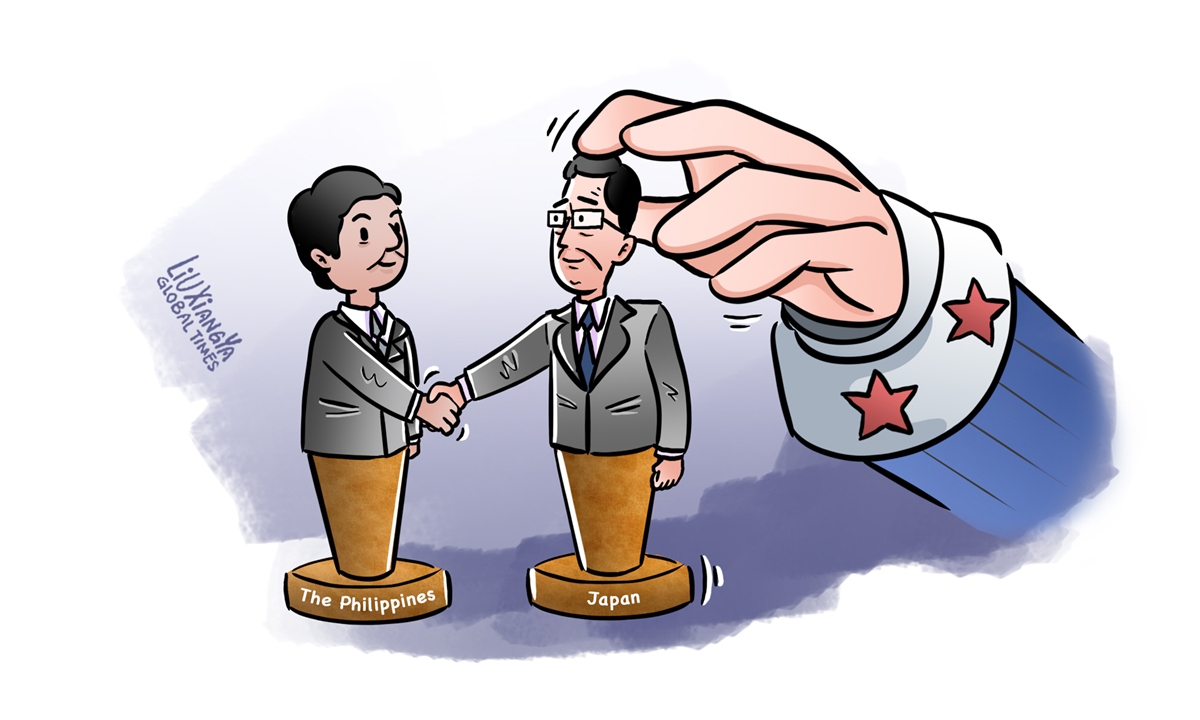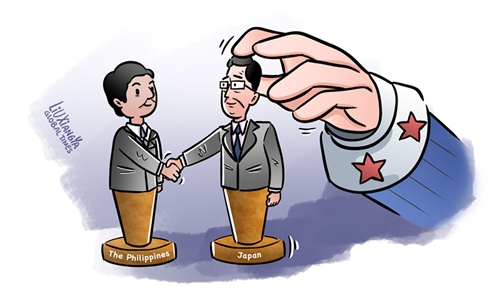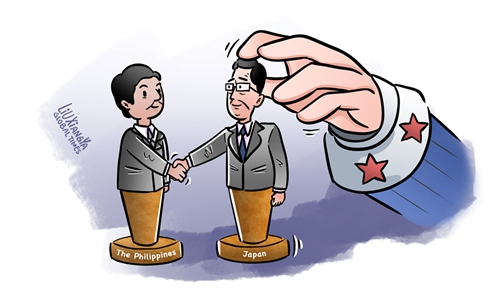
Illustration: Liu Xiangya/GT
On April 11, the first-ever trilateral summit involving the US, Japan and the Philippines was convened, hosted by US President Joe Biden. Strategic imperatives underpin this tripartite alliance. For the US, it is pivotal to realizing its Indo-Pacific or Pivot to Asia strategy, acknowledging the region's growing economic and military significance. On the other hand, Japan sees this as an opportunity to expand its security role within the constraints of its pacifist constitution, while the Philippines looks to balance against China's territorial and maritime claims in the South China Sea (SCS).Moreover, during the summit, the three countries' leaders also discussed strategies for fortifying their partnership in critical areas such as maritime security, economic growth and resilience, safeguarding strategic infrastructure, and ensuring energy resource security. The trilateral summit also discussed potential maritime activities, joint naval exercises between the three countries, and a shared commitment to uphold the 2016 Arbitral Tribunal on the SCS. In addition to the trilateral talks, President Biden met with Philippine President Ferdinand Marcos Jr to discuss enhancing security and defense cooperation within the US-PH Mutual Defense Treaty (MDT) framework. The discussion also centered on increasing cooperation on various fronts, including economic and energy security .
Nevertheless, amid the worsening tensions in the SCS between the Philippines and China, it is imperative to ask what the implications of such a trilateral defense grouping are for regional peace and security. How would other Southeast Asian countries react to this newly formed trilateral bloc and are there real benefits? Is the tripartite alliance a precursor to creating an Asia-Pacific NATO?
Repercussions
Establishing a trilateral defense alliance between the US, Japan and the Philippines has stirred the geopolitical pot in the Asia-Pacific region. This alliance, which aims to strengthen military cooperation and bolster defense strategies among the three countries, is seen by many as part and parcel of a containment strategy by the US embodied in the US Indo-Pacific or Pivot to Asia strategy in the advent of China's peaceful rise and its increasing political, diplomatic and economic influence in the Asia-Pacific region.
The enhancing trilateral cooperation signifies a strategic shift toward a more assertive posture in international relations, echoing tactics from the Cold War era. This alliance represents a determined endeavor by the US to preserve its hegemony and influential position in the Asia-Pacific theater and exert greater control over the region. It also symbolizes a unified effort to strategically challenge, encircle, isolate and diplomatically counter and contain China, highlighting the competitive geopolitical dynamics of the region amid the escalating tension brought by US-China geo-strategic rivalry and competition in the Asia-Pacific region.
This trilateral alliance between the US, Japan and the Philippines has the potential to introduce new dynamics into the regional geopolitics of Asia. While aimed at bolstering mutual security and economic ties between the three countries, such an alliance could inadvertently heighten geopolitical friction, as it may be perceived as a provocative stance against other Asian nations, particularly China. Indeed, the trilateral alliance is quite rabble-rousing. It could spark a regional arms race, possibly trigger a competitive escalation in military capabilities, cause diplomatic strains, invite reciprocal military posturing, and signal an escalation of regional geopolitical and power rivalry and competition among major powers in the Asia-Pacific. This scenario could lead to a more polarized regional environment, adversely affecting the delicate balance of power in the Asia-Pacific region and raising concerns over increased militarization and its implications for long-term regional peace and security.
In short, the trilateral alliance offers no benefits to regional countries. Its inherent exclusivity could inadvertently sow discord, potentially polarizing nations within the Asia-Pacific into factions aligned with either the interests of China or the US This realignment risks not only entrenching diplomatic divides but may also incite a competitive posture among nations as they grapple with the emerging, ever-volatile regional security landscape.
Furthermore, such a trilateral security, defense and military alliance between the US, Japan and the Philippines may result in unpredictable outcomes that could destabilize relative peace and regional security, provoke conflicts or create new regional security dilemmas and threats. For ASEAN, a bloc that prides itself on diplomacy, this trilateral alliance could be detrimental to regional equilibrium and undermine ASEAN's centrality in managing regional security issues.
In the intricate fabric of ASEAN's regional diplomacy, there is a palpable anxiety about the possibility of becoming entangled in the geopolitical tug-of-war, especially between the US and China. Countries like Indonesia and Malaysia have voiced concerns regarding an escalation in military build-up and the potential for a regional arms race. These apprehensions signal a nuanced understanding among ASEAN members. While they acknowledge the necessity of fostering a secure and balanced regional environment, they are equally determined to safeguard their sovereignty and not be seen as aligning themselves overtly with either the US or China. The crux of ASEAN's position lies in striking a delicate equilibrium between engaging with global powers for security assurances and preserving the freedom to navigate the complexities of international relations and regional geopolitical dynamics without undue influence or interference.
While concerned about regional security, ASEAN member states are also wary of being entrapped in the strategic rivalry between the US and China.
Moreover, drawing parallels to NATO, the trilateral alliance between the US, Japan and the Philippines raises questions about its potential evolution. The strategic architecture unfolding through the said trilateral alliance, in conjunction with the Quad and AUKUS pacts, reflects a concerted effort to establish a robust security fabric across the Indo-Pacific. This US-centric network of defense and security alliances draws a conceptual resemblance to NATO's structure and serves a dual purpose: fostering collaborative defense across the Pacific and Indian Oceans while implicitly aiming to counter and contain China's peaceful rise. Through these multifaceted partnerships, there is an emerging narrative of collective defense and security. It's important to note that, encapsulated in Article 5, NATO's collective defense principle posits that an attack on one is an attack on all. While the trilateral alliance has yet to adopt such a doctrine formally, the underlying sentiment of mutual defense is unmistakable.
Conclusion
The future trajectory of the trilateral alliance between the US, Japan and the Philippines will likely depend on several factors. The potential evolution of the tripartite alliance, along with broader coalitions like AUKUS and the QUAD, will be influenced by a complex interplay of regional dynamics. A key factor will be China's strategies and maneuvers within the Asia-Pacific, which have the potential to recalibrate regional security responses. Equally important is the collective resolve of ASEAN member states to forge a cohesive stance that upholds ASEAN's core principle of centrality and neutrality. This will involve navigating the geopolitical currents with diplomatic finesse and the bold assertion of a united and collective shared strategic vision that harmonizes the individual and collective interests of ASEAN member states.
The author is a senior research fellow of Global Governance Institution, and vice president of External Affairs of the Asian Century Philippines Strategic Studies Institute. opinion@globaltimes.com.cn


